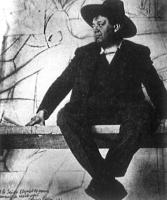 It is said in Mexico that good life stories are passionate. They are happy and painful, they tie and untie blind knots in the throat, like a harsh swallow of cheap tequila.
We set the tone and enter one of the taciturn taverns of the city of Guanajuato - the so-called "cantinas", where personal tales are distilled as the glasses advance. Rough stone walls in the half-light, damp breath. In my head, Chavela Vargas sings "Tú me acostumbraste." It's night and it's raining softly outside.
With a toast, we seal the moment. And we tell a secret life story.
It is said in Mexico that good life stories are passionate. They are happy and painful, they tie and untie blind knots in the throat, like a harsh swallow of cheap tequila.
We set the tone and enter one of the taciturn taverns of the city of Guanajuato - the so-called "cantinas", where personal tales are distilled as the glasses advance. Rough stone walls in the half-light, damp breath. In my head, Chavela Vargas sings "Tú me acostumbraste." It's night and it's raining softly outside.
With a toast, we seal the moment. And we tell a secret life story.
Face to face
27.05.2023 | by Pedro Cardoso
 Two hours with Mia Couto in an engaging conversation that covers various aspects of his interests and career, his affective geographies, the diversity of peoples and their ways of life as inspiration for the stories, the environment, and the development model to be discovered, and how to treat nature not as a "resource". We talked about hard times of violence, and the utopia of Mozambican Independence. Literary subjects do not predominate, although the Mozambican author wishes he had more time to dedicate to writing. Also thinking about how to take the pleasure of reading further and how to help bring out new writers. A writer in the terrain.
Two hours with Mia Couto in an engaging conversation that covers various aspects of his interests and career, his affective geographies, the diversity of peoples and their ways of life as inspiration for the stories, the environment, and the development model to be discovered, and how to treat nature not as a "resource". We talked about hard times of violence, and the utopia of Mozambican Independence. Literary subjects do not predominate, although the Mozambican author wishes he had more time to dedicate to writing. Also thinking about how to take the pleasure of reading further and how to help bring out new writers. A writer in the terrain.
Face to face
22.05.2023 | by Marta Lança
 The Academy (with a capital A and in singular) is for us a field of contestation. And, without a doubt, we are all positioned in it once we dare to enter it, dialogue with it, challenge it, inhabit it and/or co-construct it. Many of us have occupied this space by choice and with conviction. We face this reality every minute of our lives. That is why the manifesto “We all know” resonates and challenges us when it states that epistemic extractivism is structural and not just an isolated event in the Academy. When it affirms that the Academy is hierarchical and hierarchizing and that it promotes the accumulation of power of those at the top.
The Academy (with a capital A and in singular) is for us a field of contestation. And, without a doubt, we are all positioned in it once we dare to enter it, dialogue with it, challenge it, inhabit it and/or co-construct it. Many of us have occupied this space by choice and with conviction. We face this reality every minute of our lives. That is why the manifesto “We all know” resonates and challenges us when it states that epistemic extractivism is structural and not just an isolated event in the Academy. When it affirms that the Academy is hierarchical and hierarchizing and that it promotes the accumulation of power of those at the top.
Mukanda
28.04.2023 | by várias
 In the exhibition the sun does not rise in the north, de Miranda proposes one-person tales navigating between fictional and non-fictional narratives in the affective space of the border. The exhibition investigates the landscapes that witness hope, from the journeys of migration between Africa and Europe, set within a duality of existence and citizenship: one contemplating Europe and the other a return to Africa.
In the exhibition the sun does not rise in the north, de Miranda proposes one-person tales navigating between fictional and non-fictional narratives in the affective space of the border. The exhibition investigates the landscapes that witness hope, from the journeys of migration between Africa and Europe, set within a duality of existence and citizenship: one contemplating Europe and the other a return to Africa.
I'll visit
26.04.2023 | by Cindy Sissokho
 Intended to inspire young people interested in the sport of football, a bronze statue to the Portuguese footballer Cristiano Ronaldo was installed in December 2021 in the coastal town of Calangute, Goa (India). However, rather than having said desired effect, the statue received immediate backlash by local residents that staged a protest with black flags. To understand the contention over the statue, in this essay I will concisely unpack the controversy behind the statue and a history of Portuguese colonialism that its existence provokes. Arguing, although created for innocent reasons, the statue to the Portuguese footballer is a contemporary example of cultural neocolonialism and that the statue has no place in Goa, or anywhere else within India.
Intended to inspire young people interested in the sport of football, a bronze statue to the Portuguese footballer Cristiano Ronaldo was installed in December 2021 in the coastal town of Calangute, Goa (India). However, rather than having said desired effect, the statue received immediate backlash by local residents that staged a protest with black flags. To understand the contention over the statue, in this essay I will concisely unpack the controversy behind the statue and a history of Portuguese colonialism that its existence provokes. Arguing, although created for innocent reasons, the statue to the Portuguese footballer is a contemporary example of cultural neocolonialism and that the statue has no place in Goa, or anywhere else within India.
To read
26.04.2023 | by Andrew Nunes
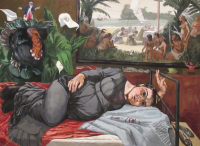 In light of current public debates sparked by the publication of the chapter "The walls spoke when no one else would: Autoethnographic notes on sexual-power gatekeeping within avant-garde academia," included in the edited volume Sexual Misconduct in Academia: Informing an Ethics of Care in the University (Routledge 2023), we express our full solidarity with the authors. We extend the same solidarity to other voices that came out publicly, as well as to all those subjected to abuses of power and other forms of violence both in academic contexts and beyond. This document is a collective and unfinished contribution to an ongoing debate.
In light of current public debates sparked by the publication of the chapter "The walls spoke when no one else would: Autoethnographic notes on sexual-power gatekeeping within avant-garde academia," included in the edited volume Sexual Misconduct in Academia: Informing an Ethics of Care in the University (Routledge 2023), we express our full solidarity with the authors. We extend the same solidarity to other voices that came out publicly, as well as to all those subjected to abuses of power and other forms of violence both in academic contexts and beyond. This document is a collective and unfinished contribution to an ongoing debate.
Mukanda
18.04.2023 | by várias
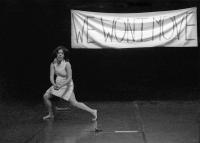 When Sarah Bergh and Sandra Chatterjee asked me to write some thoughts about Dance, Body and Protest, one of the first thing, that I remembered was one of my dance productions called Permanent Prints (1999), premiered at Kampnagel Hamburg. This production was a triptych, constituted of three different choreographic works, one of those pieces, we called it Duett, casted by myself and Cristina Moura. While the audience rushed into the theater space we would be on stage, sitting at a chair, looking at the audience, with an empty look, the set-design was a self-written banner hanging above our heads, on which we could read the statement „We won’t move“. My main concern was to bring up themes for reflection such as multicultural identities (today I would have used the terminology ‚body of cultures‘), gender, racism, sexism, and social political conflicts. Dancer and choreographer Angela Guerreiro has never performed unclothed in her solos or pieces; instead, she has addressed multicultural identity and gender issues, racism, sexism and (social) political conflicts in her work.
When Sarah Bergh and Sandra Chatterjee asked me to write some thoughts about Dance, Body and Protest, one of the first thing, that I remembered was one of my dance productions called Permanent Prints (1999), premiered at Kampnagel Hamburg. This production was a triptych, constituted of three different choreographic works, one of those pieces, we called it Duett, casted by myself and Cristina Moura. While the audience rushed into the theater space we would be on stage, sitting at a chair, looking at the audience, with an empty look, the set-design was a self-written banner hanging above our heads, on which we could read the statement „We won’t move“. My main concern was to bring up themes for reflection such as multicultural identities (today I would have used the terminology ‚body of cultures‘), gender, racism, sexism, and social political conflicts. Dancer and choreographer Angela Guerreiro has never performed unclothed in her solos or pieces; instead, she has addressed multicultural identity and gender issues, racism, sexism and (social) political conflicts in her work.
Stages
28.03.2023 | by Angela Guerreiro
 Nurturing faith and congregating the faithful into groups of followers, all sorts of leaders emerged in the Sertão, often transmuting themselves in the process: from counselors to preachers, from priests to messiahs, from blessed to saints, all combinations were possible. When congregations took on contestations in political dimensions, they quickly came to be seen as a threat to the established order. For the authorities and representatives of official Catholicism, the religious leader then became an impostor, revolutionary, or bandit. The police or the army oversaw reducing the rebels - leader, and followers.
Nurturing faith and congregating the faithful into groups of followers, all sorts of leaders emerged in the Sertão, often transmuting themselves in the process: from counselors to preachers, from priests to messiahs, from blessed to saints, all combinations were possible. When congregations took on contestations in political dimensions, they quickly came to be seen as a threat to the established order. For the authorities and representatives of official Catholicism, the religious leader then became an impostor, revolutionary, or bandit. The police or the army oversaw reducing the rebels - leader, and followers.
Afroscreen
21.03.2023 | by Anabela Roque
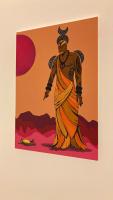 In Portugal we have no racial-ethnic categorization legally approved. That means we are not legally able to identify social inequalities in terms of race. This is an important warning of how Portuguese society works and how this social silence from politics informs us that they are not interested in identifying this problem. But we can do this visually. Just look who are the people that are leading art institutions and curatorship to understand this gap. I created a blog - an informal exercise - where I put some information about this gap.
In Portugal we have no racial-ethnic categorization legally approved. That means we are not legally able to identify social inequalities in terms of race. This is an important warning of how Portuguese society works and how this social silence from politics informs us that they are not interested in identifying this problem. But we can do this visually. Just look who are the people that are leading art institutions and curatorship to understand this gap. I created a blog - an informal exercise - where I put some information about this gap.
Mukanda
13.03.2023 | by Rodrigo Ribeiro Saturnino (ROD)
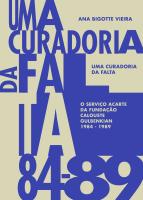 The questions raised by Ana Bigotte, on the contrary, are not formulated in the strict disciplinary framework of art history, but from the porous and open framework of theory and cultural studies, taking as fundamental references the work of authors such as Luís Trindade or Boaventura de Sousa Santos, whose object goes beyond the specific sphere of the artistic to approach culture as a social process with multiple branches. It does so by following the path opened by André Lepecki, who formulated interesting hypotheses about the construction of the Portuguese social "body" from the study of dance and performance. This is another distinctive specificity of the Portuguese case that contrasts with that of the neighboring country: the focus on the arts of the body and the so-called "living arts", such as theater, dance, and music.
The questions raised by Ana Bigotte, on the contrary, are not formulated in the strict disciplinary framework of art history, but from the porous and open framework of theory and cultural studies, taking as fundamental references the work of authors such as Luís Trindade or Boaventura de Sousa Santos, whose object goes beyond the specific sphere of the artistic to approach culture as a social process with multiple branches. It does so by following the path opened by André Lepecki, who formulated interesting hypotheses about the construction of the Portuguese social "body" from the study of dance and performance. This is another distinctive specificity of the Portuguese case that contrasts with that of the neighboring country: the focus on the arts of the body and the so-called "living arts", such as theater, dance, and music.
Stages
06.03.2023 | by Jesús Carrillo
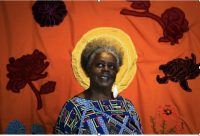 I argue that by working within the porous intersection between feminism and race, Evaristo writes back against Western phallogocentrism, under whose domain “a man’s body gives credibility to his utterance, whereas a woman’s body takes it away from hers”. Moreover, in re-constructing her own version of the Black female body, Evaristo strives to counter what Spillers describes as the processes by which “the dynamics of signification and representation […unravelled] the gendered female” through the marking of Black woman’s “flesh as a prime commodity of exchange” during slavery. This leads in Poemas to a rejection of sexuality’s lexical crisis under enslavement, or rather, a rejection of the ways in which bodily “dispossession as the loss of gender” translates into Blackness’s “anagrammatical [abuttal]” of the feminine/familial markers ‘woman’ and ‘mother’. Disavowing the ‘American Grammar’ as such allows for Evaristo’s re-vindication of Black flesh, seeing it transfigured into an embodied cipher of shared heritage, unified resistance, and communal healing – a project of re-inscription which, drawing on the theoretical idiom of Christina Sharpe, I shall call ‘wake work’. The kaleidoscopic meanings of ‘wake’ abound in Sharpe’s writing, encompassing “the keeping watch with the dead, the path of a ship, a consequence of something, […] awakening, and consciousness” – at once appealing to the historical traumas of the Middle Passage and the violent slave-plantation economy, ‘wokeness’, and projects of memorialisation.
I argue that by working within the porous intersection between feminism and race, Evaristo writes back against Western phallogocentrism, under whose domain “a man’s body gives credibility to his utterance, whereas a woman’s body takes it away from hers”. Moreover, in re-constructing her own version of the Black female body, Evaristo strives to counter what Spillers describes as the processes by which “the dynamics of signification and representation […unravelled] the gendered female” through the marking of Black woman’s “flesh as a prime commodity of exchange” during slavery. This leads in Poemas to a rejection of sexuality’s lexical crisis under enslavement, or rather, a rejection of the ways in which bodily “dispossession as the loss of gender” translates into Blackness’s “anagrammatical [abuttal]” of the feminine/familial markers ‘woman’ and ‘mother’. Disavowing the ‘American Grammar’ as such allows for Evaristo’s re-vindication of Black flesh, seeing it transfigured into an embodied cipher of shared heritage, unified resistance, and communal healing – a project of re-inscription which, drawing on the theoretical idiom of Christina Sharpe, I shall call ‘wake work’. The kaleidoscopic meanings of ‘wake’ abound in Sharpe’s writing, encompassing “the keeping watch with the dead, the path of a ship, a consequence of something, […] awakening, and consciousness” – at once appealing to the historical traumas of the Middle Passage and the violent slave-plantation economy, ‘wokeness’, and projects of memorialisation.
To read
09.12.2022 | by Isobel Jones
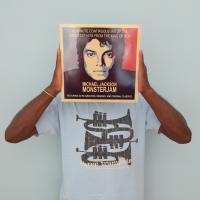 Balanced between various cultures, he has lived for 31 years in a more open and diverse Lisbon, an openness and diversity to which people like Lucky have contributed so much, from building the city to making the city dance.
This is a city of hard times, but also of encounters and possibilities with which he has grown up. In this text, we are led by the memories of Dj Lucky, between various sound tracks of quisange, semba, and afro blues, and multiple tracks on the floor, from Kinshasa to the Graça neighborhood, passing through Luanda, Cova da Moura, and Bairro Alto.
Balanced between various cultures, he has lived for 31 years in a more open and diverse Lisbon, an openness and diversity to which people like Lucky have contributed so much, from building the city to making the city dance.
This is a city of hard times, but also of encounters and possibilities with which he has grown up. In this text, we are led by the memories of Dj Lucky, between various sound tracks of quisange, semba, and afro blues, and multiple tracks on the floor, from Kinshasa to the Graça neighborhood, passing through Luanda, Cova da Moura, and Bairro Alto.
Face to face
15.11.2022 | by Marta Lança
 Why does this matter? Some experts argue that the saturation of elections has significant downsides — exhausting voters and hurting the quality of governance by pushing lawmakers toward more campaigning, fund-raising and short-term thinking.
Why does this matter? Some experts argue that the saturation of elections has significant downsides — exhausting voters and hurting the quality of governance by pushing lawmakers toward more campaigning, fund-raising and short-term thinking.
Games Without Borders
08.11.2022 | by German Lopez
 At its heart, MIXED is an exploration of racial and cultural identity. MIXED deals specifically with people that have mixed heritage, delving into the experiences of each subject that also echo his own. The series addresses the existential feeling of not fully belonging, while examining the cost of assimilation within society. The conversations focus especially on the contradiction of fitting in everywhere but nowhere at the same time and the resulting shoot is a collaboration that encompasses the themes considered.
At its heart, MIXED is an exploration of racial and cultural identity. MIXED deals specifically with people that have mixed heritage, delving into the experiences of each subject that also echo his own. The series addresses the existential feeling of not fully belonging, while examining the cost of assimilation within society. The conversations focus especially on the contradiction of fitting in everywhere but nowhere at the same time and the resulting shoot is a collaboration that encompasses the themes considered.
Stages
02.11.2022 | by Theo Gould
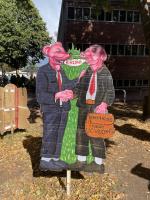 Always identified with audacity, - or, as seen in the international press, marked with “controversies” and even “scandals” - the event is among the largest and most important in the art world. The fifteenth edition that was recently carried out was not exempt from a “scandal”: the unanimity of the German press in its judgment of anti-Semitism.
Always identified with audacity, - or, as seen in the international press, marked with “controversies” and even “scandals” - the event is among the largest and most important in the art world. The fifteenth edition that was recently carried out was not exempt from a “scandal”: the unanimity of the German press in its judgment of anti-Semitism.
To read
02.11.2022 | by Cheong Kin Man
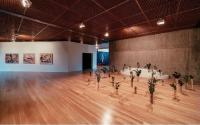 This exhibition presents around 60 works by 21 artists whose family origins lie in the former colonies in Africa. Born and raised in a post-colonial context, they are artists whose works have become unavoidable in European contemporary art, proposing a reflection on their heritage, their memories and their identities.
This exhibition presents around 60 works by 21 artists whose family origins lie in the former colonies in Africa. Born and raised in a post-colonial context, they are artists whose works have become unavoidable in European contemporary art, proposing a reflection on their heritage, their memories and their identities.
To read
01.11.2022 | by Marta Lança
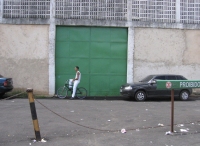 Growing up, Felipe Adão had to navigate two worlds: one as a Brazilian, the other as an Afro-Brazilian. He studied at private schools, but lived in an underprivileged area of Campinas, a city in the state of São Paulo. Both his friends from school and his friends from the street had an influence on his upbringing.
Growing up, Felipe Adão had to navigate two worlds: one as a Brazilian, the other as an Afro-Brazilian. He studied at private schools, but lived in an underprivileged area of Campinas, a city in the state of São Paulo. Both his friends from school and his friends from the street had an influence on his upbringing.
Games Without Borders
21.10.2022 | by Jessy Damba Diamba
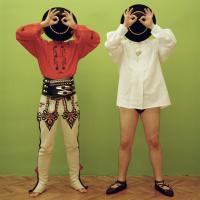 The exhibition, which aims to give voice to a young generation of photographers in Poland, also includes the work of Irena Kalicka, a young artist who is critical of her country’s tendency to turn to the extreme right. I had the opportunity to present a photograph of her in the magazine “Fantasia Macau” last year.
The exhibition, which aims to give voice to a young generation of photographers in Poland, also includes the work of Irena Kalicka, a young artist who is critical of her country’s tendency to turn to the extreme right. I had the opportunity to present a photograph of her in the magazine “Fantasia Macau” last year.
To read
21.10.2022 | by Cheong Kin Man
 Shortly after Amini’s violent death on 16 September, protests broke out and spread from the Kurdish parts of Iran to the whole country and the world. Demonstrators chanted the Kurdish slogan “jin, jiyan, azadî” – “woman, life, freedom”. But in news reports, particularly Western ones, Jîna Amini’s Kurdish identity has been erased – she is described as an Iranian woman and her ‘official’ Persian name ‘Mahsa’ – which for her family and friends existed only on state-documents –is the one in headlines. Calls to “say her name” echo in real life and across social media but unwittingly obscure Jîna’s real name and, in doing so, her Kurdish identity.
Shortly after Amini’s violent death on 16 September, protests broke out and spread from the Kurdish parts of Iran to the whole country and the world. Demonstrators chanted the Kurdish slogan “jin, jiyan, azadî” – “woman, life, freedom”. But in news reports, particularly Western ones, Jîna Amini’s Kurdish identity has been erased – she is described as an Iranian woman and her ‘official’ Persian name ‘Mahsa’ – which for her family and friends existed only on state-documents –is the one in headlines. Calls to “say her name” echo in real life and across social media but unwittingly obscure Jîna’s real name and, in doing so, her Kurdish identity.
Games Without Borders
18.10.2022 | by Meral Çiçek
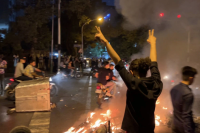 In the aftermath of Mahsa Amini’s death under Iran’s state custody, students have recently given a new energy to the weeks-long protests. They launched large demonstrations at Tehran University on Saturday and Sharif University on Sunday, according to a stream of videos that continue to be released. Protests were also reported at campuses in the central city of Isfahan, Kerman in the south, Mashhad in the northeast, Tabriz in the northwest, and elsewhere.
In the aftermath of Mahsa Amini’s death under Iran’s state custody, students have recently given a new energy to the weeks-long protests. They launched large demonstrations at Tehran University on Saturday and Sharif University on Sunday, according to a stream of videos that continue to be released. Protests were also reported at campuses in the central city of Isfahan, Kerman in the south, Mashhad in the northeast, Tabriz in the northwest, and elsewhere.
Games Without Borders
12.10.2022 | by Sanya Mansoor